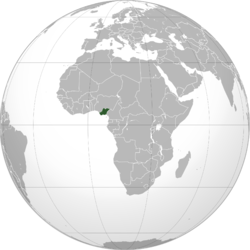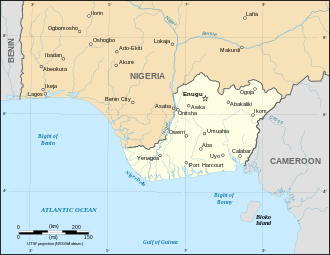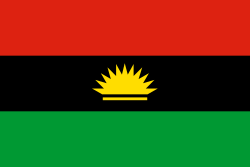| Republic of Biafra | ||||
| Unrecognized state | ||||
| ||||
|
Flag | ||||
| Motto "Peace, Unity, Freedom" | ||||
| Anthem Land of the Rising Sun | ||||
 Light green: Republic of Benin, a Biafran puppet state. | ||||
 | ||||
| Capital | Enugu | |||
| Language(s) | English (official) Igbo / Ibo (predominant) Efik · Annang · Ibibio · Ekoi | |||
| Government | Republic | |||
| President | C. Odumegwu Ojukwu | |||
| Historical era | Cold War | |||
| - Established | 30 May 1967 | |||
| - Rejoins Federal Nigeria | 15 January 1970 | |||
| Area | ||||
| - 1967 | 77,306 km2 (29,848 sq mi) | |||
| Population | ||||
| - 1967 est. | 13,500,000 | |||
| Density | 174.6 /km2 (452.3 /sq mi) | |||
| Currency | Biafran pound | |||
| Minahan, James (2002). Encyclopedia of the Stateless Nations: S-Z. Greenwood Publishing Group. p. 762. ISBN 0-313-32384-4. | ||||
Biafra, officially the Republic of Biafra, was a secessionist state in south-eastern Nigeria that existed from 30 May 1967 to 15 January 1970, taking its name from the Bight of Biafra (the Atlantic bay to its south).[1] The inhabitants were mostly the Igbo people who led the secession due to economic, ethnic, cultural and religious tensions among the various peoples of Nigeria. The creation of the new country was among the causes of the Nigerian Civil War, also known as the Nigerian-Biafran War.
Land of the Rising Sun was chosen for Biafra's national anthem, and the state was formally recognised by Gabon, Haiti, Côte d'Ivoire, Tanzania and Zambia. Other nations which did not give official recognition but which did provide support and assistance to Biafra included Israel, France, Portugal, Rhodesia, South Africa and the Vatican City.[2] Biafra also received aid from non-state actors, including Joint Church Aid, Holy Ghost Fathers of Ireland, Caritas International, MarkPress and U.S. Catholic Relief Services.[2]
After two-and-a-half years of war, during which a million civilians had died in fighting and from famine, Biafran forces agreed to a ceasefire with the Nigerian Federal Military Government (FMG), and Biafra was reintegrated into Nigeria.[3]
- ↑ Room, Adrian (2006). Placenames of the World: Origins and Meanings of the Names for 6,600 Countries, Cities, Territories, Natural Features and Historic Sites. McFarland & Company. p. 58. ISBN 0-7864-2248-3.
- ↑ 2.0 2.1 Nowa Omoigui. "Federal Nigerian Army Blunders of the Nigerian Civil War – Part 2". Retrieved 15 August 2008.
- ↑ Barnaby Philips (13 January 2000). "Biafra: Thirty years on". BBC News. Retrieved 9 March 2011.
